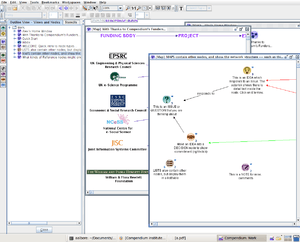Compendium (software)
 Screenshot of v.1.5.2 | |
| Developer(s) | Compendium Institute |
|---|---|
| Written in | Java |
| Operating system | Cross-platform |
| License | LGPL |
| Website | compendium.open.ac.uk/institute/ |
Compendium is a computer program and social science tool that facilitates the mapping and management of ideas and arguments. The software provides a visual environment that allows people to structure and record collaboration as they work through "wicked problems". The software is currently released by the not-for-profit Compendium Institute. The current version operationalises the Issue-Based Information System (IBIS), an argumentation mapping structure first developed by Horst Rittel in the 1970s.
Compendium source code was fully released under LGPL licence on 13 January 2009.[1]
Applications
Compendium visually represents thoughts and illustrates the various interconnections between different ideas and arguments.
The creation of "issue maps" graphically represents the relations between issues and questions and facilitates the understanding of interconnected topics through pictoral representation.
It can be used by a group of people in a collaborative manner to convey ideas to each other using visual images.
Features
- Drag and drop documents and websites onto a map
- Complete freedom to arrange icons
- Keyword tagging
- Map and label the connections between concepts to illustrate links
- Create 'Dialogue Maps' to display links to everyone’s ideas in group projects
- Create 'Argument Maps' to work collaboratively, editing each other's writing
- Share learning pathways
- Organise large amounts of information
- Place resources in sequence to develop a learning path
- Publish maps
History
Compendium is the result of fifteen years of development in collaborative modelling, however the theory behind the software hails from the seventies, when IBIS (Issue-Based Information System) was first conceptualized by Horst Rittel and Jeff Conklin. It is a fairly modern example of a personal knowledge base.
Many associations have thence contributed ideas to the development of Compendium. These institutions include Blue Oxen Associates, Center for Creative Leadership, Knowledge Media Institute - Open University, Verizon, CogNexus Institute, and Agent iSolutions.[citation needed]
See also
References
External links
| ||||||||||||||